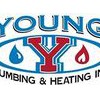
Did you know that an energy star rating on your heating system translates to better air quality as well as increased efficiency? For instance, this type of furnace is designed to reduce the risk of backdrafting dangerous carbon monoxide fumes into the home.
Small changes can help your furnace operate more efficiently. Here are some examples: Move furniture away from your vents, replace your furnace filter regularly, and install insulation around your windows and doors.
Do you live in a climate with moderate heating needs? If you live somewhere that would never see snow and where long summer months are the norm, then heat pumps offer an energy-efficien t alternative to furnaces and air conditioners.
You probably rely on a furnace of one type or another to heat your home at least one season of the year. In some moderate weather areas of the country, though, homes require no additional temperature control. Care to guess how many U.S. homes have no onboard heating systems? That would be about 1 percent.
Check your filter at least once a month, and change it if necessary. Dirty filters not only waste energy, but may actually allow dust and dirt to build up in your heating system, leading to expensive maintenance and/or repairs.
Similar Businesses







